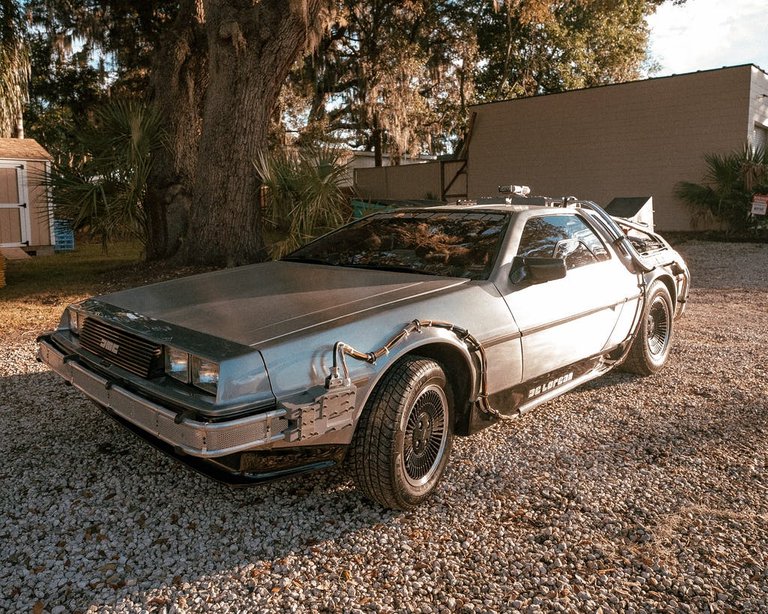Some problems of time travel [en-es]
physicists are eager to explore the possibilities of time travel, in principle, for a good reason: as we have already indicated, it is important to study the limits of physical laws under extreme conditions. Physicists insist on emphasizing (especially when they need money to build a new particle accelerator) that the universe itself was originally such an accelerator.
J. Richard Gott, Time travel and Einstein's universe.

Foto de Raphael Loquellano en Pexels
A few days ago I saw some movies that talked about time travel, I don't remember the names but they weren't some of the best anyway (with the exception of Back to the Future which is my all time favorite). That led me to think about some issues that, in case it were possible to time travel (which I don't think), may arise when moving in time.
In my opinion, time travel is hardly feasible because, as I believe, time is only a mental support tool, a way to categorize the change of matter or events in reality. There is only space.
Time is just a very useful invention. Unlike and like distance which measures space, time measures the change of space, i.e., it is dependent on space. That is why it is known as space-time. To travel in time is to assemble or reassemble matter, to transform it to a past state or accelerate it to a future state. And to do that at an immense level is very complex.
I think it's possible to do pretty good simulations of events based on known variables, but it's very difficult to simulate the interaction. Seeing the past or the future with a device is more possible than traveling to those times physically.
Traveling to the future or past could be done in isolation to an object or a group of objects, but even so, it sounds to difficult
Now, let's assume that it is possible
The classic problems with temporal travel are those that arise from continuity. If what exists today is dependent on what was before, then a change in what was changes what is. That is, if I change the past, I change the future.
This is exemplified in the classic grandfather paradox: if I go to the past and kill my grandfather, how is it possible that I was born and traveled to the past to kill my grandfather? Or if I prevent my mom and dad from getting together, will my hand disappear while I play on the guitar a song I learned from an artist who learned it from me?
ACCORDING TO COSTA AND TOBAR THE EVENTS TO WHICH A PHYSICAL SYSTEM IS SUBJECTED ARE ALWAYS READJUSTED TO PREVENT INCONSISTENCIES.
This theory, known as , holds that even if we can travel into the past, whatever we do then will not change the future. This because the future or today is as it is because of the past, which includes having traveled to the past. This action, traveling to the past, is also part of what today is. Although they don't explain it that way, but say that the physical system always readjusts itself to prevent inconsistencies which doesn't sound like a good explanation, it makes it look like the system is thinking.
Another problem also occurs to me: if the machine that propels me on the trip does so only through the temporal dimension, does it mean that in the spatial one I remain at the same point? The problem is that the planet moves. If I travel into the past I will appear in the same place in space but at a different time. Most likely the earth was not in the same position, and I will end up in outer space. Unless at that moment in time in the past, the earth was in the exact same position as at the time of travel.
Traveling into the future is much less problematic, perhaps even more feasible. If the trip will be made by traveling through space at high speed as hypothetically established by the theory of relativity, then we would arrive in the future having undergone few changes in our body. Here what is difficult is to travel at high speed, to resist the trip and not to crash on the way.
But if traveling to the future were done with a machine that moves in the time dimension only, then there is the problem of space that I mentioned: Where will I appear?
These are some well-known problems of time travel. An interesting and fun mental exercise.
los físicos se afanan en explorar las posibilidades del viaje en el tiempo, en principio, por una buena razón: como ya hemos indicado, es importante estudiar los límites de las leyes físicas bajo condiciones extremas. Los físicos insisten en destacar (especialmente cuando necesitan dinero para construir un nuevo acelerador de partículas) que el propio universo en sus orígenes era un acelerador de esta clase.
J. Richard Gott, Los viajes en el tiempo y el universo de Einstein
Hace unos días vi unas películas que hablaban sobre los viajes temporales, no recuerdo los nombres pero no eran de las mejores de todos modos (a excepción de Volver al Futuro que es mi favorita de todos los tiempos temporales). Eso me llevó a pensar en algunas problemáticas que, en caso de que fuese posible viajar temporalmente (que no creo), se pueden presentar al moverse en el tiempo.
En mi opinión, es poco factible el viaje en el tiempo porque, según creo, el tiempo es sólo una herramienta de apoyo mental, una forma de categorizar el cambio de la materia o de los sucesos en la realidad. Solo existe el espacio.
El tiempo es solo una invención muy útil. A diferencia y al igual que la distancia que mide el espacio, el tiempo mide el cambio del espacio, es decir, es dependiente de el espacio. Por eso se le conoce como espacio-tiempo. Viajar en el tiempo es armar o rearmar la materia, transformarla a un estado pasado o acelerarla para llevarla a un estado futuro. Y hacer eso a un nivel inmenso es muy complejo.
Creo que es posible hacer simulaciones bastantes buenas de los sucesos en base a variables conocidas, pero es muy difícil simular la interacción. Ver el pasado o el futuro con un aparato es más posible que viajar hacia esos tiempos físicamente.
Viajar al futuro o al pasado podría hacerse de manera aislada a un objeto o a un grupo de objeto, pero aún así, suena a difícil
Ahora, supongamos que sí se puede
Los clásicos problemas de los viajes temporales son los que se derivan de la continuidad. Si lo que existe hoy es dependiente de lo que fue antes, entonces un cambio en lo que fue cambia lo que es. Es decir, si cambio el pasado, cambio el futuro.
Esto se ve ejemplificado en la clásica paradoja del abuelo: si voy al pasado y mato a mi abuelo, ¿Como es posible que yo naciera y viajara al pasado para matar a mi abuelo? O si evito que mi mamá y mi papá se junten, ¿Se me desaparecerá la mano mientras toco en la guitarra una canción que aprendí de un artista que la aprendió de mí?
SEGÚN COSTA Y TOBAR LOS ACONTECIMIENTOS A LOS QUE ESTÁ SOMETIDO UN SISTEMA FÍSICO SIEMPRE SE REAJUSTAN PARA PREVENIR LAS INCONSISTENCIAS
Esta teoría, conocida como, sostiene que aún cuando se pueda viajar al pasado, todo lo que hagamos entonces no cambiará el futuro. Esto porque el futuro o el hoy es como es a causa del pasado, lo que incluye el haber viajado al pasado. Esta acción, viajar al pasado, también es parte de lo que es hoy. Aunque no la explican así, sino que dicen que el sistema físico siempre se reajusta para prevenir las inconsistencias lo que no suena a buena explicación, hace ver que el sistema es pensante.
También se me ocurre otro problema: Si la máquina que me propulsa en el viaje lo hace solo a través de la dimensión temporal, ¿quiere decir que en la espacial permanezco en el mismo punto? El problema es que el planeta se mueve. Si viajo al pasado apareceré en el mismo lugar en el espacio pero en otro momento. Lo más probable es que la tierra no estuviese en la misma posición, y terminaré en el espacio exterior. A menos que en ese momento en el tiempo pasado, la tierra estaba en la misma exacta posición que en el momento del viaje.
Viajar al futuro es mucho menos problemático, incluso tal vez más factible. Si el viaje se realizará recorriendo el espacio a alta velocidad como hipotéticamente establece la teoría de la relatividad, pues se llegaría al futuro habiendo sufrido nuestro cuerpo pocos cambios. Aquí lo difícil es viajar a alta velocidad, resistir el viaje y no chocar en el camino.
Pero si viajar al futuro se hiciera con una máquina que se mueve en la dimensión temporal solamente, pues esta el problema del espacio que mencioné: ¿Dónde apareceré?
Estos son algunos problemas muy conocidos del viaje temporal. Un interesante y divertido ejercicio mental.

Posted with STEMGeeks
Congratulations @migka! You have completed the following achievement on the Hive blockchain and have been rewarded with new badge(s):
Your next target is to reach 4250 upvotes.
You can view your badges on your board and compare yourself to others in the Ranking
If you no longer want to receive notifications, reply to this comment with the word
STOPCheck out the last post from @hivebuzz:
Support the HiveBuzz project. Vote for our proposal!